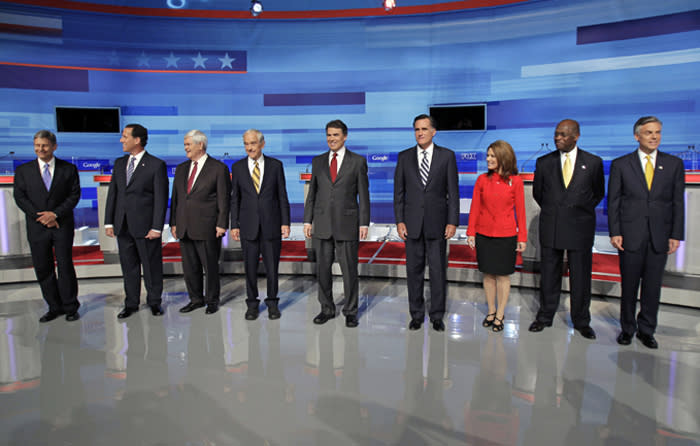 The Ticket
The TicketAre Republican presidential hopefuls having too many debates?
Even by the standards of the fast-moving, frontloaded early primary schedule, this has been a remarkably unsettled campaign season for the Republican party. And much of this stability doesn't stem from the traditional bulwarks of the nominating battle--the push to boost candidate fundraising or endorsements. Instead, candidate are gaining or losing ground largely on the basis of how they've performed on the debate stage.
Just ask Tim Pawlenty, who never recovered from botching a question about Mitt Romney's health care policies during an early debate. Or Michele Bachmann--whose stronger-than-expected performance in the first major GOP debate fueled her rise in the polls over the summer. Or Rick Perry, who was viewed as a GOP savior when he entered the race in August--and who is now struggling to save his campaign amid dismal debate reviews.
More so than in any other presidential cycle in recent memory, this year's primary debates have exerted an outsize influence in redefining expectations about the field of candidates. And the debates are also one of the key reasons no candidate has truly emerged as a clear frontrunner in the race.
And this dynamic has some conservatives questioning whether the slew of debates—the candidates are set to meet for their seventh televised debate tonight, with 13 more planned events to go—is actually hurting the party's chances against President Obama next year.
Writing in the Wall Street Journal, The Weekly Standard's Fred Barnes suggests the debates have "overwhelmed the Republican race" and made the contest "more combative" than it might have been.
Barnes argues the biggest—and perhaps most damaging--impact of this year's long debate slog has been to prolonging the lifespan of "marginal candidates" who have no chance of actually winning the nomination.
'The debates put them on equal footing with candidates who are well-financed and better organized. The marginal candidates have no incentive to drop out," Barnes writes. "Once the also-rans sign up for a debate, the stronger candidates are all but required to show up, if only to avoid the embarrassment of being represented before a national audience by an empty chair. The also-rans and the cable people have them over a barrel."
Barnes also argues that the succession of debates also gives the Obama campaign an early glimpse at the vulnerabilities and strengths of the GOP field--a process that could hurt the eventual Republican nominee.
"All Mr. Obama has to do is sit back and enjoy the show," he writes.
Other popular Yahoo! News stories:
• Tuesday's Republican debate will save Perry's campaign, or end it
• Muslim woman sues Southwest for kicking her off San Diego-bound flight


